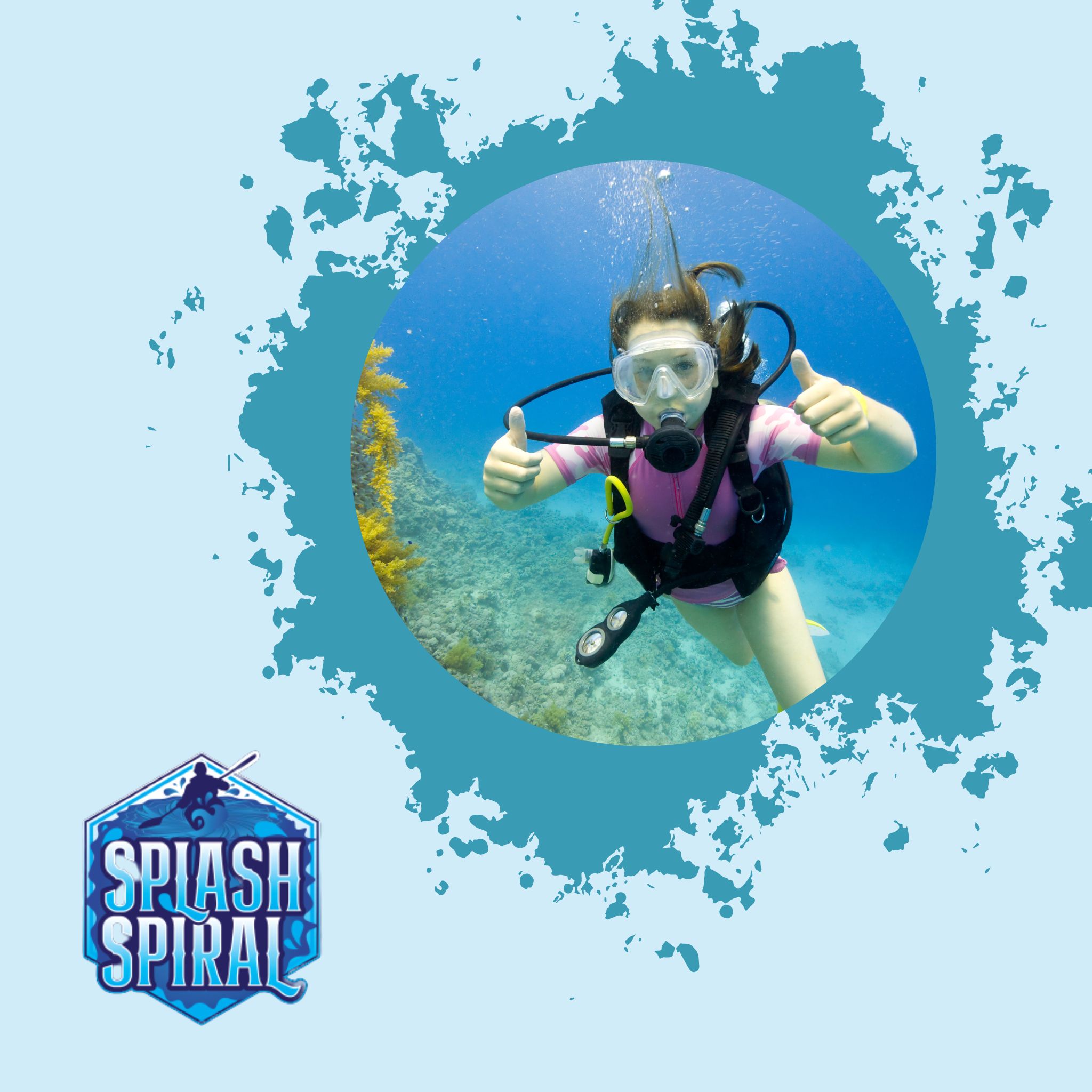
Scuba diving is a thrilling underwater activity enjoyed by many people around the world. It involves diving deep under the water using specialized equipment, such as tanks of compressed air, to breathe while exploring the depths of the ocean. While scuba diving can be an exhilarating and rewarding experience, it is important to remember that it can also be dangerous if not approached with caution and respect.
Definition of Scuba Diving
Scuba diving stands for self-contained underwater breathing apparatus. It is a type of underwater diving where divers use a cylinder containing compressed air or other gas mixtures to breathe while exploring underwater environments. The equipment used in scuba diving includes regulators, which control the flow of air from the cylinder into the diver’s mouthpiece, and buoyancy control devices, which help divers maintain neutral buoyancy so that they can move around more easily in the water.
The Importance of Age Restrictions in Scuba Diving
While scuba diving can be a fun and exciting activity for people of all ages, it is important to establish age restrictions to ensure that divers are physically and mentally capable of handling such an intense experience. Children who are too young may not have developed enough mentally or physically to handle scuba diving safely.
Age restrictions also help regulate dive training programs, ensuring that instructors teach appropriate techniques based on their students’ developmental stages. By following age restrictions for scuba diving, we ensure everyone’s safety during dives and prevent accidents or injuries from occurring due to lack of knowledge or skills related to inexperience with both physical and cognitive development.
Minimum Age Requirements for Scuba Diving
When it comes to scuba diving, age requirements are a crucial factor. In general, to become a certified diver, you have to be at least 10 years old.
However, the minimum age requirement may vary depending on the level of certification and the diving organization. One of the most reputable scuba diving organizations in the world is PADI (Professional Association of Diving Instructors).
PADI sets standards for diver training and issues certifications recognized around the globe. According to PADI standards, children as young as 10 years old can enroll in a Junior Open Water Diver course.
This course allows them to dive with an adult certified diver or a PADI Professional up to a maximum depth of 12 meters (40 feet). Upon turning 15 years old, Junior Open Water Divers can upgrade their certification status without any additional training.
PADI Standards for Junior Open Water Diver Certification
To earn a Junior Open Water Diver certification under PADI guidelines, children must complete classroom work, confined water dives (in a pool), and four open water dives with their instructor or another certified adult diver. The course curriculum is designed specifically for younger divers and focuses on safety standards and proper equipment use.
Parents who want their children to learn scuba diving should consider choosing an experienced instructor or dive center that follows PADI guidelines strictly. Since scuba diving involves risks, it is important that the children receive proper training before they embark on any underwater journey.
Age Requirements for Other Scuba Diving Organizations
While PADI is one of the biggest scuba diving organizations globally, other organizations have different minimum age requirements for junior divers. For example, SSI (Scuba Schools International) offers Snorkel & Skin Diver courses for kids aged six years and older. However, SSI’s Open Water Diver course is only available for children who are 10 years old or older.
Other scuba diving organizations, such as NAUI (National Association of Underwater Instructors) and SDI (Scuba Diving International), also have different minimum age requirements for their courses. Parents should always research the specific age requirements of the organization they are considering before enrolling their children in a scuba diving course.
Factors that Influence the Minimum Age Requirement
Scuba diving is a thrilling activity that requires specific physical and cognitive abilities. It is important to consider these factors when determining the minimum age requirement for scuba diving. There are two primary factors that influence the minimum age requirement: physical and cognitive development, and depth limitations and equipment usage.
Physical and Cognitive Development
The physical and cognitive development of a child is an essential factor to consider when setting age restrictions in scuba diving. As children grow, their bodies develop various physiological features such as bone mass, lung capacity, muscle strength, balance control, coordination, visual perception, and decision-making skills. According to PADI standards for junior open water certification, children as young as 10 years old can receive training for scuba diving.
However, it’s critical to understand that every child’s developmental timeline is different; some children could advance faster than others at a younger age or vice versa. In general, experts suggest waiting until children reach puberty due to greater maturity levels in physical ability.
Depth Limitations and Equipment Usage
The depth of a dive can have critical effects on divers of all ages; it’s not just about how deep you go but also how long you stay there with many other factors coming into play like nitrogen accumulation and oxygen toxicity among others. Therefore depth limitations must be considered when considering age restrictions in scuba diving.
In terms of equipment usage – carrying heavy tanks or wearing bulky wetsuits can be especially challenging for younger divers who lack enough muscle strength or body mass to handle such weight properly. To ensure safety underwater – training programs incorporate guidelines which include recommendations on size-to-weight ratio of gear used by different age groups since young diver’s buoyancy control may not be perfect due to incomplete growth processes or nervousness.
It is essential to follow the guidelines provided by certified diving institutions to ensure the safety of young divers. Age restrictions in scuba diving are critical for ensuring the safety of divers.
Physical and cognitive development as well as depth limitations and equipment usage need to be considered when setting these restrictions. Young people should only participate in diving activities under appropriate supervision and guidance from certified professionals to ensure their safety.
Exceptions to the Minimum Age Requirement
Despite the clear age requirements set by scuba diving organizations, there are several exceptions to this rule. These exceptions are typically made for family diving programs and special needs divers.
Family Diving Programs
Many scuba diving centers offer family diving programs that allow children as young as eight years old to participate in an introductory dive with their parents or guardians. These programs are designed to provide younger children with a safe and fun way to experience scuba diving under the direct supervision of a certified instructor. The depth of these dives is typically limited and the equipment used is specially designed for children.
Family diving programs are an excellent way for families to bond over a unique experience. They also provide a great opportunity for children to develop an interest in scuba diving from an early age, which can lead them down the path towards becoming certified divers later in life.
Special Needs Divers
Scuba diving is not just limited to individuals without disabilities. Many specialized schools offer adaptive scuba diving courses that allow individuals with physical or cognitive disabilities to participate in this amazing water activity. These courses are tailored specifically towards each individual’s needs, ensuring that everyone can safely enjoy the underwater world.
Special needs divers may require additional assistance or modifications during their dives, such as using specialized equipment or having extra support from dive buddies or instructors. However, many find that scuba diving offers them a sense of freedom and independence they might not otherwise experience on land.
While there may be minimum age requirements for scuba diving certification, exceptions do exist for family programs and special needs divers. It’s important that these individuals have access to safe ways of experiencing this incredible activity so that everyone has the opportunity to explore the beauty under the sea!
Conclusion:
Recap of minimum age requirements and factors influencing them
As we have seen, the minimum age requirement for scuba diving varies depending on the certification agency and other factors such as physical and cognitive development, depth limitations, and equipment usage. PADI’s minimum age requirement for Junior Open Water Diver Certification is 10 years old while other organizations may have different age restrictions.
It is important to note that these restrictions are in place to ensure the safety of divers. Additionally, physical and cognitive development play a significant role in determining the minimum age requirement for scuba diving.
Children under 10 years old may not yet have developed the necessary skills to handle themselves underwater or understand dive safety protocols. Depth limitations also play a part; younger divers may not be able to handle the pressure at deeper depths or carry heavy equipment.
Importance of following age restrictions in scuba diving
It is crucial to follow age restrictions in scuba diving for safety reasons. Younger divers who do not meet the minimum age requirement may not have developed the necessary skills and abilities needed to dive safely.
As such, they can put themselves, their dive partners, and even instructors at risk. Moreover, following these restrictions helps maintain high standards within the sport of scuba diving.
Organizations like PADI set strict guidelines that help ensure proper training for each level of certification. By adhering to these standards, we can help create a safe environment where everyone can enjoy this amazing activity without unnecessary risks.
While it might be tempting to bend rules or cut corners when it comes to scuba diving’s minimum-age requirements (especially when your child begs you), it is crucial that we respect these regulations when considering taking our kids on any underwater adventure. Keeping them safe should always take precedence over any adventurous spirit!







